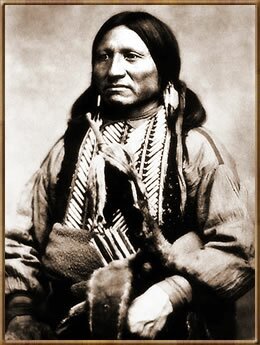Kicking Bird
(ca. 1835-1875)

Tene-angop'te, "The Kicking Bird," or "Eagle Striking," also known as Watohkonk, "Black Eagle," was a Kiowa chief widely known for his wisdom as a leader and his courage and strength as a warrior. Little is known of his early life; his grandfather was a Crow captive who had been adopted into the tribe. As a leader Kicking Bird advocated peace with the Whites, realizing the ultimate hopelessness of military resistance, and tried to persuade his people to accept what he felt was inevitable. Accordingly, at Wichita, Kansas, he signed the first Kiowa Treaty in 1865; this set up a reservation whose boundaries were subsequently established in the Treaty of Medicine Lodge in 1867.
Kicking Bird and his people did not participate in the militant opposition of many of the Indian people against a move to the reservation, and he was a strong force for peace; yet his friendliness towards the Americans bore little fruit. In 1873 the government failed to keep a promise to free Kiowa chiefs who had been captured earlier. This, together with the theft of Indian horses and cattle by Whites, and the continued encroachment of buffalo hunters on the reservation land, caused many of the tribe to doubt the wisdom of his policies. At one point, taunted by his people for a lack of courage, he proved he had not lost his warrior spirit or ability by leading a victorious war party against a detachment of troops in Texas.
When another Kiowa chief, Lone Wolf, began gathering a force to war against the White buffalo hunters, the decision as to which side to support was difficult and dangerous. Kicking Bird still believed in the ultimate wisdom of peace, however, and was able to persuade more than one-half of the tribe to keep out of the hostilities. He was eventually head chief of all of the Kiowa, and continued a project of improving education among his people. He prevailed upon Thomas C. Battey, the Indian Agent, to open the first school for the tribe; as this work was proceeding, he died suddenly at Cache Creek-his friends say he was poisoned-on May 3, 1875, and was buried at Fort Sill, Oklahoma in the post cemetery. He is known to have had one wife name Guadalupe.
|